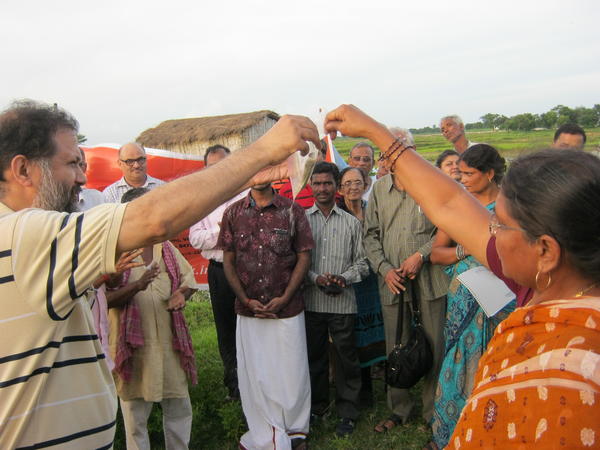Sunday 21st July 2013 at Narhi Park of Study and Reflection, Bihar, India; a gathering of around fifty humanists meeting on an all-India, plus Asia guests, occasion who jointly took the opportunity to scatter ashes of Silo at the site.
It was a sunny morning fresh from the nightly showers this time of year in this part of India, nearer Patna than Kolkata, and rather up towards the Nepal border. The opportune moment followed two days of talks by participants who were involved in the various organisations stemming from the Humanist Movement inspired by Silo, a South American activist philosopher-writer.
They had shared their various activities and gathered from as far physically apart as New Delhi, Mumbai, Kerala, Tamil Nadu and nearer the host state, Jharkand, besides Nepal and Hong Kong. Messages were read from Philippines, Bangladesh and Pakistan – plus one from Argentina.
Amid the proceedings, and the usual laughter because Madam Ludism often entered into things, a few moments of calm and collected togetherness descended upon them all, also thanks to the Ceremony of Service from the representative of one of the Communities of Silo’s Message.
In this solemn mood the ashes were dispersed.
On the following day a Bodhi Tree sapling was planted on that same spot and that choice was not accidental as the Buddha’s teaching was one that was given some recognition by Silo himself as going in the same direction, to overcome suffering, as Silo stated as a fundamental aim in his harangue, “The Healing of Suffering”, pronounced May 4, 1969, on the slopes of the great Aconcagua mountain range bordering Argentina and Chile.
This was Silo’s first public expression of his ideas. In poetic language, he explained that the most important knowledge for living (“true wisdom”) is not the same as the knowledge found in books—knowledge of universal laws or things of that nature—but is a question of inner experience. The most important knowledge for living is related to comprehending suffering and how to surpass it.
Indeed, that place in those great mountains is the very site of the first such Park of Study and Reflection, that of Punta de Vacas.
Some of those gathered that day in Bihar were pilgrims to that original Park and were here today to honour and witness and further the work.










